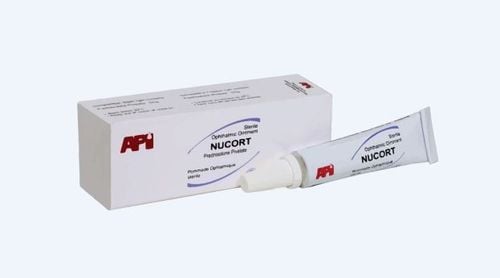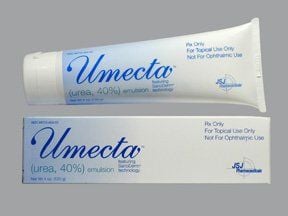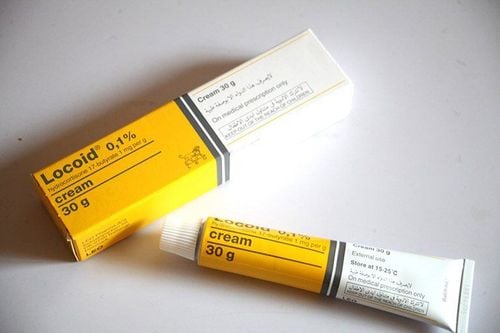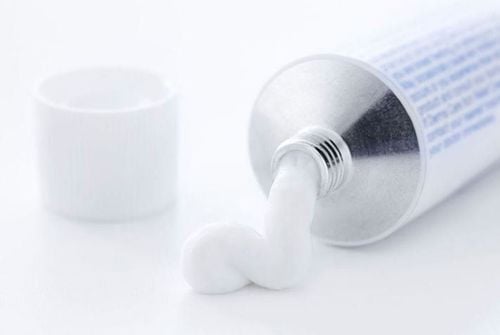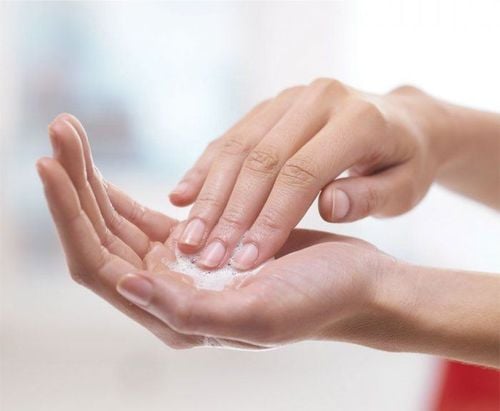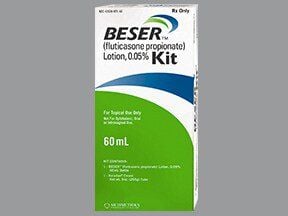This is an automatically translated article.
Ultravate contains Halobetasol, a potent corticosteroid, available in the form of a lotion, cream, or ointment for the skin. Ultravate is used to treat skin diseases. In order to use the drug effectively, patients need to learn some information about the uses, dosage and notes when using Ultravate in the article below.1. What is Ultravate?
Ultravate medicine contains Halobetasol, which belongs to the group of corticosteroids. Ultravate is available in the form of lotions, creams and ointments for the skin. Ultravate lotion comes in a bottle containing 60mL (59g) of halobetasol propionate 0.05%. Ultravate cream and ointment tube contains 50g of 0.05% halobetasol propionate cream or ointment.
Ultravate (for the skin) is used to treat inflammation and itching caused by plaque psoriasis or other steroid-responsive inflammatory skin conditions.
Ultravate suppresses the body's overactive immune response, which causes redness and inflammation (swelling). Corticosteroids are thought to act as antipruritic and vasoconstrictor agents through induction of inhibition of the release of arachidonic acid, a precursor of prostaglandins and leukotrienes, both mediators of inflammation. This helps control inflammation and itching caused by general skin irritation. Ultravate is metabolised in the liver, excreted in the urine and bile.
2. What effect does Ultravate have?
Ultravate lotion is used to treat plaque psoriasis in adults. Skin manifestations appear red, itchy patches.
Ultravate cream and ointment is used to treat swelling and itching of the skin, including eczema, poison ivy dermatitis, and rashes.
In clinical studies, people with moderate to severe plaque psoriasis used Ultravate lotion for up to 2 weeks. After 2 weeks, 44.5% of people using Ultravate lotion had recovered or almost completely recovered from plaque psoriasis. This number was compared with 6.3-7.1% of those using a placebo. People who used Ultravate lotion saw less scaling, redness, and increased plaque than those who used a placebo (plaque increase is skin thickening due to a build-up of dead skin cells).
In a clinical study, Ultravate ointment or placebo ointment was used on people with chronic eczema for 2 weeks. At the end of 2 weeks, 83% of those using Ultravate ointment had cleared or nearly cleared their eczema patches compared with 28% of those using a placebo ointment.
3. How to take Ultravate
Follow all directions on the medicine label. The medication is for external use only. Do not take orally. Do not use Ultravate on open wounds or on irritated, sunburned, dry skin. Avoid getting Ultravate in your eyes or mouth. Wash your hands before and after using Ultravate, unless you are using this medicine to treat skin on your hands. Apply a thin layer of topical Ultravate to the affected area and massage gently. Do not apply this medication to large areas of skin. Do not cover the treated area with a bandage or other covering material, as this can increase the amount of medicine absorbed through the skin, causing side effects.
4. Dosage of the drug Ultravate
The dose of Ultravate your doctor prescribes will depend on several factors, including: The type and severity of your medical condition, your age, and the form of Ultravate you are taking. Take the dose your doctor has prescribed, which is the best dose for you.
Apply a thin layer of Ultravate lotion to the affected area 2 times a day until improvement or for up to 2 weeks.
5. Contraindications of the drug Ultravate
Do not use Ultravate if you are allergic to its ingredients. Ultravate is not for use by anyone under 12 years of age.
6. Notes when taking Ultravate
If you are treating the intimate area, do not use plastic pants or tight pants. Ultravate is for short-term use only (2 weeks or up to 8 weeks for psoriasis). Ultravate should be discontinued when skin symptoms are under control. Tests may be needed to make sure this medicine is not causing unwanted effects. If symptoms do not improve or get worse, call your doctor. Ultravate should not be stopped suddenly. Follow your doctor's instructions about reducing your dose. Steroid medications can increase the amount of glucose in the blood or urine. Tell your doctor if you have diabetes. Tell your doctor if you have ever had: Any type of skin infection; skin reactions to any steroid medicine; adrenal gland disorders; liver failure. It is not known whether Ultravate will harm an unborn baby. Tell your doctor if you are pregnant. If you apply Ultravate to your chest, avoid areas that may come into contact with your baby's mouth, it may not be safe for a child to use this medicine. Ultravate should not be used to treat acne, as it can make acne worse instead of better. If your skin condition gets worse, tell your doctor. They may be able to recommend a treatment other than Ultravate. Due to the risk of side effects, treatment with Ultravate lotion for longer than 2 weeks is not recommended, using no more than 50g (50mL) of Ultravate lotion a week. Ultravate should only be used during pregnancy if the benefit to the mother outweighs any possible harm to the baby. Human studies have shown that approximately 6% of a dose enters the systemic circulation on average 96 hours after initial administration. A study in 12 adult subjects administered topically with halobetasol propionate for 8 days showed maximum plasma concentrations 3 hours after administration.
7. Ultravate side effects
Using Ultravate in high doses or for a long time can lead to thinning of the skin, easy bruising, changes in body fat, increased acne or facial hair, menstrual problems, impotence. Children may be more likely to have side effects from absorbing large amounts of Ultravate through the skin. The more common side effects of Ultravate may include: Stinging, burning, itchy skin, dry skin, redness, pustules on the skin, skin atrophy (thinning), acne or bumps on the skin, skin discoloration/lightening, headache. Very rare serious side effects: Hypothalamic-pituitary-adrenal axis suppression (adrenal atrophy) may occur when Ultravate is applied to large areas of the skin or used with high doses for a long time. Symptoms of Cushing's syndrome include increased fat accumulation in the face/abdomen/upper back, stretch marks, thinning skin, slow wound healing, acne, and high blood sugar. If you have signs of an allergic reaction: hives, difficulty breathing, swelling of your face/lips/tongue or throat, call 911 right away. There have also been reports of rare eye-related side effects when creams containing corticosteroids such as Ultravate are used for long periods of time on the face or around the eyes. These side effects include glaucoma, decreased vision, and cataracts.
8. Ultravate drug storage
Store the medicine at room temperature between 15 and 30 degrees Celsius, avoid low humidity and high temperature. Do not freeze, puncture, or incinerate the empty container. Keep this medicine out of sight and reach of children.
9. Ultravate drug interactions
Topical drugs do not interact with other drugs you use. Tell your doctor about all the medicines you use, vitamins, and herbal products. There are no known interactions between alcohol and the drug Ultravate. There are no known drug interactions between Ultravate and other drugs. There have not been any herbs or supplements that have been specifically reported to interact with Ultravate. There are no known interactions between Ultravate and any foods. Ultravate is a potent corticosteroid used to treat plaque psoriasis or other steroid-responsive inflammatory skin conditions. However, the harmful effects of corticosteroids are very great, so you must carefully read the instructions for use, consult your doctor before using.
Please dial HOTLINE for more information or register for an appointment HERE. Download MyVinmec app to make appointments faster and to manage your bookings easily.




